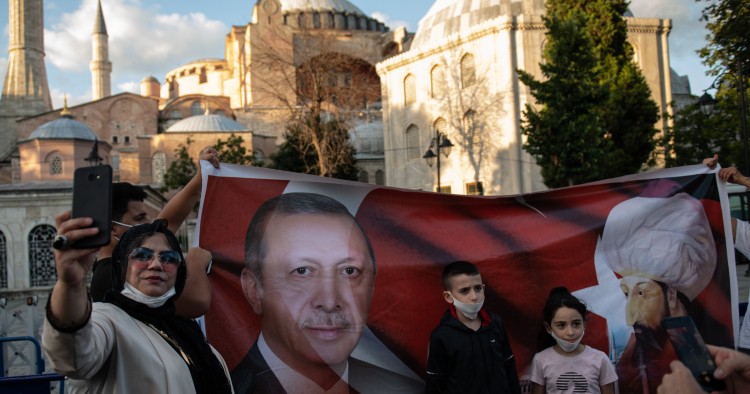This week's briefing on recent news and upcoming events in the region featuring Seren Selvin Korkmaz, Marvin G. Weinbaum, Mirette F. Mabrouk, Robert S. Ford, and Nilsu Goren.
Erdoğan and the “symbolic war” over Hagia Sophia
Seren Selvin Korkmaz
Non-resident Scholar
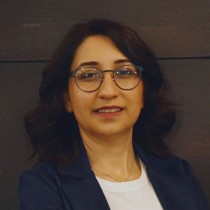
President Recep Tayyip Erdoğan issued a decree on Friday ordering Istanbul’s historic Hagia Sophia to be converted back into a mosque. Completed in 537 as a Byzantine Christian cathedral, Hagia Sophia was converted into a mosque by Sultan Mehmet II after the Ottoman conquest in 1453. In 1934, under President Mustafa Kemal Atatürk, it was turned into a museum by government decree.
Hagia Sophia has long been the focus of “symbolic wars” between secularists and Islamists in Turkey. For years, the Turkish conservative right, leaning on Islamism and nationalism, has dreamed of turning it back into a mosque, and Erdoğan has now made their dream a reality. However, the decision was motivated by more than just a desire to realize a long-time Islamist goal.
Erdoğan and his Justice and Development Party (AKP) currently face severe domestic political challenges. Since the outbreak of COVID-19, the fragile state of Turkey’s economy has become clear, and the AKP has faced increasing difficulty in addressing citizens’ everyday financial problems. However, municipalities led by the opposition Republican People’s Party (CHP) have managed the crisis successfully despite the severe obstacles imposed by the government. Furthermore, the AKP and its far-right ally the Nationalist Action Party (MHP) have lost their monopoly on the right wing of the political spectrum with the emergence of the Future and Democracy and Progress (DEVA) parties as two AKP breakaway parties, alongside the existing MHP breakaway Good Party (İYİ Party). As a result, Erdoğan is facing a strong attack from a large opposition that has the capacity to ensure a unified election block against him. Recent polls suggest that the AKP and MHP would have difficulty winning a majority in a future presidential election.
Under these circumstances and in the absence of concrete policies to handle the country’s economic and political problems, Erdoğan seeks salvation in populist identity politics. He boosts Turkish nationalism and Islamism and targets opposition figures — mainly from the CHP and the pro-Kurdish Peoples’ Democratic Party (HDP) — to energize his base. Although there have been divergent responses to the Hagia Sophia decree from different opposition actors, the responses remained weak. By bringing religion onto the agenda, Erdoğan has once again manage to paralyze the secular CHP and unite the right.
When he faces major domestic political difficulties, Erdoğan often exploits polarization and Turkey’s existing social cleavages (right-left, secular-Islamist, Kurd-Turk). However, there is also continuity in the AKP’s hegemonic claims. Since 2002, the party has come to control not only the institutional apparatus of the state, but has also transformed the state and national identity of the country, promoting a blend of Islamic and Turkish nationalism. The visibility of Islamic and Ottoman symbols in society and public life has increased in the AKP era, and a new form of national identity is being created with the support of mass media, architectural design, Islamic arts, and discursive practices. Hence, the issue of Hagia Sophia needs to be understood in the context of President Erdoğan’s short-term and long-term agenda. As he falls in the polls and the opposition bloc increases its power, he loses his pragmatic side and focuses more on ideology.
Growing Afghan doubts about the Taliban and peace
Marvin G. Weinbaum
Director for Afghanistan and Pakistan Studies

The prospect of peace talks with the Taliban has provided a rare beacon of hope for an Afghan people struggling with grinding poverty, endemic violence, and now an insidious pandemic. With the stage seeming set for peace talks there is growing impatience for the serious negotiations to begin. But over recent weeks the Taliban’s actions, both militarily and politically, have left a growing segment of the population uneasy about the peace process. Increasing doubts about the Taliban’s sincerity and intentions are particularly visible in government circles.
Disappointingly, in advance of expected talks the Taliban has unleashed a high level of violence. Last week it launched 284 attacks covering nearly half the country’s provinces. In Kabul where residents have recently experienced multiple bomb blasts, fears for personal security have soared. Prisoner releases that were expected to set the long-awaited intra-Afghan dialogue in motion have instead proved a roadblock and a display of Taliban inflexibility. There are also disturbing reports that among the more than 4,000 prisoners freed so far, some have already violated an agreement not to return to the field. Trust in the Taliban also suffered a setback last week when human rights observers reported that contrary to claims, in Taliban-controlled areas very little had changed from past social and governing practices.
Suspicions about the Taliban have deepened among the country’s top leadership. In highly noteworthy remarks last week both President Ashraf Ghani and his negotiating chief Abdullah Abdullah reflected on a possibly too steep price for peace. Ghani pronounced that while all Afghans seek an end to the conflict, “we don’t want peace to destroy us.” Abdullah declared that the country was not prepared to compromise at the expense of “the achievements of the people of Afghanistan and the fundamental rights of the people.” Both leaders are clearly apprehensive of a Taliban bent on dismantling the framework of the current republic.
As the Trump administration prepares for a further drawdown in troops from Afghanistan, fears in Kabul continue to mount that the Taliban is waiting out the Americans before showing its true colors. Although the Afghan government is highly unlikely to turn its back on holding peace talks, the current mood in Kabul reveals growing uncertainty about whether the Taliban is prepared to compromise and integrate with the government or is determined to remake the Afghan state.
This article was co-authored by Sawera Khan, Jack Stewart, and Hamid Safi, research assistants to Marvin G. Weinbaum.
Zaki case shines a light on the treatment of women in Egypt
Mirette F. Mabrouk
Senior Fellow, Director of Egypt program
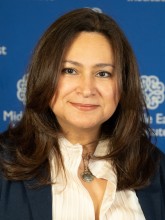
In the midst of increasing economic misery resulting from the pandemic’s economic fallout, questions over the situation in Libya, and a permeating national anxiety about the morbid state of negotiations over the Grand Ethiopian Renaissance Dam, one subject has pushed to the fore in Egyptian public discussion.
On July 4, Ahmed Bassam Zaki, a 21-year-old, was arrested by the public prosecutor’s office after the National Council for Women (NCW) filed a complaint on the heels of an Instagram account that had garnered over 100 separate accusations against him, ranging from predatory telephone messages to rape. Two days later, he was remanded for 15 days pending investigation. The charges include “attempting to rape three women, one of whom was under 18 years of age, indecently assaulting them with force, and threatening them and others to engage in sex and not to break off relations with him, purposefully disturbing them by sending many messages without their permission, and using private social media accounts to commit these crimes, thereby violating their private lives.” An earlier statement had included references to “impugning the girls’ honor” and “incitement to moral depravity.”
The case has gripped Egypt’s public sphere not simply because it has all the makings of a sensational drama — Zaki comes from a rich and influential family, the allegations span over five years in both Egypt and Spain, and it’s likely that this staggering record of abuses and apparent impunity owes much to the protection afforded by wealth and power — but also because it has shone a light, once again, on the way Egyptian society treats women.
In theory, women hold an exalted and revered position in Egyptian society. They represent the honor of the family and are to be respected and treated with dignity, kindness, and chivalry. Much is made of the Prophet Muhammad’s saying that the person one should show the most respect to is one’s mother (three times over). In reality, Egypt remains a patriarchal society with an ingrained view of the superiority of men, and women have to fight hard for any respect they get. It would be difficult to find a woman between the ages of 12 and 60 who has not been verbally harassed while doing nothing more than walking down the street. Despite the fact that there is a law on the books on verbal harassment, carrying a punishment of three months’ hard labor, it happens constantly, with impunity. And it has been almost impossible to eradicate the impression that such harassment is invariably the woman’s fault. Questions inevitably follow about what the woman was doing and what she was wearing. Following the Zaki allegations, Abdallah Roushdy, a popular preacher, declared that “one of the reasons for sexual harassment is women that wear short and tight clothes.”
The idea that women are a representation of the family’s honor is a double-edged sword, both sides of which come down on the women. In much the same way standard bearers have to keep their flags up, women who have been assaulted are perceived to have let those flags fall to ground. At best, families will hang their heads in shame. At worst, women are still murdered for having “lost” their (and the family’s) virtue.
Women’s rights activists in Egypt are, rightly, viewing the furor over the case as a victory. Public opinion is largely with the victims. Roushy was promptly suspended by Al-Azhar, which put out a statement in support of victims, rejecting victim blaming and firmly noting that “women’s clothing — whatever it might be — is never an excuse for attacking her freedom, privacy, and dignity.” More importantly, the statement touched a nerve: “Silence or turning a blind eye to these crimes threatens the security of society and encourages violations.” Society plays a large role in the failure to protect women but the law has much to answer for as well.
Zaki is being charged with “attempting to force women to have unconsensual sex” because all rape allegations under the law 267 of the Penal Code require forensic evidence. The charges carry a sentence of between 3 and 15 years. Law 267, however, acknowledges only vaginal rape. One of the allegations against Zaki involves sodomy, which is only counted as an assault, under law 268. In its defense, he public prosecutor’s office went with the lighter charge because considering the allegations are over three years old, it’s the only one it would have any chance of proving.
And the fact that charges were brought at all is something of a victory. Women are often pressured into dropping rape charges, urged to substitute lighter ones, and are questioned by male officers who are products of their patriarchal society, with little or no training in sexual assault cases. In a comment on her Facebook page, women’s rights lawyer Nihad Abo el-Komsan noted that once the victims had learned they would have to give evidence in a police station, to male officers, they wanted to retract. She called this reluctance “a frightening indication of the level of faith in the justice system and protection.”
Before the Zaki allegations, at least four drafts of legislation dealing with violence against women (drafted by the NCW and MPs Nadia Henry, Mona Moneir, and Soulaf Darwish) had appeared to die on the vine over the past several years. The delays were especially disappointing considering the speed with which public policy legislation and even constitutional amendments have been rammed through by this Parliament. All three women are currently pressing the issue at the People’s Assembly.
The issue is further complicated by the fact that the public attitude toward victims, not to mention the state’s, is often directly linked to their socioeconomic status. While Zaki’s alleged victims have generally been come from more privileged classes, several TikTok influencers have been arrested over the past few months for various infringements on “Egypt’s moral standing,” a particularly nebulous category that most journalists will recognize. It falls into the same class as stories “affecting Egypt’s national security, “ a convenient catch-all that allows for enormous leeway in arrest and prosecution. Mena Abdel Aziz, a young TikTok and YouTube vlogger, appeared in a video alleging to have been raped and beaten. She later appeared with her alleged rapist and retracted her claims. She was first questioned by the police, in the presence of her lawyers, as a victim, only to be later questioned without them as a defendant. She’s currently in custody, in a women’s shelter. The social demarcation line appears clear; the lower down the socioeconomic scale a women is, the greater a risk to Egyptian society.
Arrests around morality are hardly new in Egypt. One can argue that they’re often a means of playing to the lowest common denominator, with the state holding itself up as an arbiter of national morals. However, society’s greater concept of security is directly impacted by this ad-hoc treatment of justice. The current government has been very clear on its desire to ensure equality for women. However, while one can make a case for the difficulty of modifying entrenched attitudes, there appears to still be a distinct gap between policy and practice. Harassers on the street might not have gotten the memo on civil rights, but state employees, the police, and the courts certainly should have. Egyptians are currently struggling with the fallout from a pandemic, economic austerity, rising inflation and unemployment and if the state wants to avoid unrest it needs to provide at least the appearance of a stable and just society, without deference to wealth or status. Continuously alienating half of that society is a precarious way to go about it.
Syria: Russia curtailing aid access to the north
Robert S. Ford
Senior Fellow
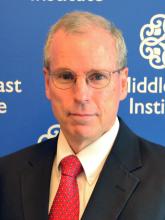
On Saturday the UN Security Council voted to keep a single border crossing open for humanitarian aid into northern Syria. The remaining crossing at Bab al-Hawa provides direct access into Idlib, where three million civilians depend heavily on outside aid. The Saturday vote ends UN humanitarian use of the Bab al-Salam crossing farther to the east that provides the best supply access to another million civilians in northern Aleppo Province. In the face of rising civilian needs due to food price inflation and spread of COVID-19, the UN and its aid partners had ramped up deliveries into northern Syria. International aid organizations warned that closing Bab al-Salam will reduce deliveries into northern Aleppo and increase suffering, especially among women and children, who make up the large majority of the Syrian civilians sheltering in Idlib and northern Aleppo.
In January 2020 four border crossings from Turkey and Iraq enjoyed UN Security Council authorization for the UN-led humanitarian relief operation to access Syria. Russia, backed by China, has succeeded in pressuring the Security Council to close all but Bab al-Hawa. UN Secretary-General António Guterres told the Security Council on June 24 that while aid deliveries inside government-controlled territories were also rising, Damascus still hampers UN access to many former opposition towns under government control and impedes transport of aid across lines from government to opposition-controlled areas. Russia aims to gradually boost Syrian government leverage over stubbornly resistant opposition territories like Idlib. Russian pressure next year will focus on Bab al-Hawa. In the meantime, as the humanitarian situation grows bleaker amid Syria’s broader economic collapse and the gradually spread of the pandemic, aid agencies will scramble to boost the through-put at Bab al-Hawa.
75 years on from the first nuclear explosion, the Middle East is a hotbed of nuclear risks
Nilsu Goren
Non-resident Scholar
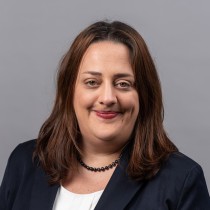
From the global pandemic to Australian wildfires to a 21st century civil rights movement, 2020 has been a transformative year that will surely be remembered for generations.
July 16, 2020 will also mark the 75th anniversary of the world’s first nuclear explosion at the “Trinity site” as part of the Manhattan Project.
According to the “Doomsday Clock” put out by the Bulletin of the Atomic Scientists, it is “100 seconds to midnight,” and as of 2020, we are closer to the risk of nuclear war than ever before.
At the international level, renewed great power competition, the Trump administration’s reported consideration of resuming low-yield nuclear testing, and the ongoing U.S.-Russia talks on the possible extension of the New START Treaty will shape the next decade of strategic stability.
Mirroring the global trends, the Middle East continues to be a hotbed of nuclear risks. As the only region where nuclear, chemical, and biological weapons have either been developed, acquired, or used, ongoing proxy conflicts and terrorist activity continue to raise questions about the risks posed by these asymmetric capabilities should they fall into the wrong hands. It is a particularly relevant concern given the long list of countries in the region with alleged nuclear weapons programs, as well as those with existing and planned nuclear reactors.
And then there is the Iranian nuclear program. The recent explosions in Iran seem to have damaged and set back the nuclear fuel enrichment program at Natanz. Following the U.S. withdrawal from the 2015 Joint Comprehensive Plan of Action (JCPOA) and in the absence of a new U.S. strategy with regional buy-in, particularly from the Gulf States, there is still potential for military escalation entangling Iran, Israel, and Saudi Arabia further, particularly in Syria, Iraq, and Yemen.
As Sylvia Mishra recently suggested, the COVID-19 quarantine has been an opportunity to re-watch Doomsday movies and nuclear classics. Whether it is the Chernobyl meltdown or an accidental missile launch, 2020 also seems like an appropriate year to be asking questions about command and control in a world of great uncertainty.
Photo by Burak Kara/Getty Images
The Middle East Institute (MEI) is an independent, non-partisan, non-for-profit, educational organization. It does not engage in advocacy and its scholars’ opinions are their own. MEI welcomes financial donations, but retains sole editorial control over its work and its publications reflect only the authors’ views. For a listing of MEI donors, please click here.













